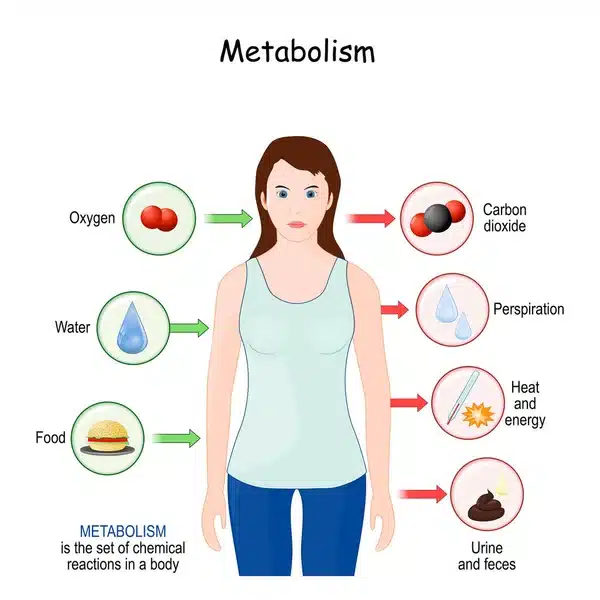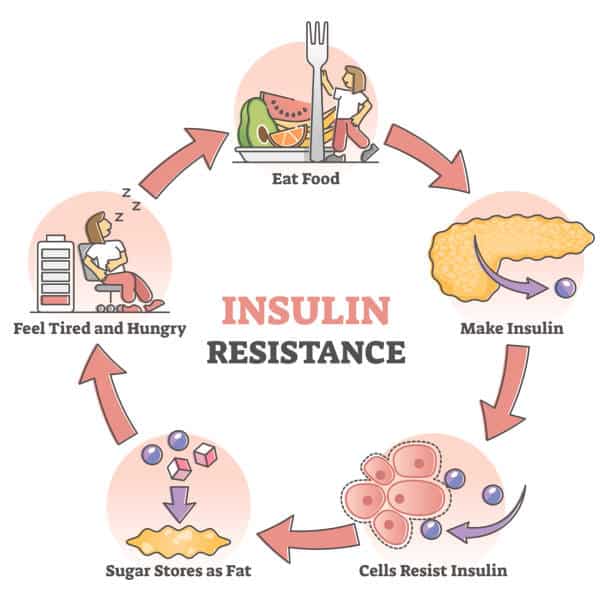
Metabolism And Weight ManagementThe human body is a complex ecosystem, constantly burning fuel to power its intricate functions. This internal furnace, aptly named metabolism, plays a central role in weight...
Metabolism And Weight Management
The human body is a complex ecosystem, constantly burning fuel to power its intricate functions. This internal furnace, aptly named metabolism, plays a central role in weight management. Understanding how metabolism works and the factors that influence it empowers individuals to navigate their weight journey effectively.
Metabolism plays a crucial role in determining one's weight and overall health. It is the intricate biochemical process that allows our bodies to convert food into energy, fueling every function from breathing to thinking. At LifeRx.md, we understand that effective weight management hinges on understanding and optimizing your metabolism.
Let’s explore the science behind metabolism, unveil the myths surrounding it, and provide practical strategies to optimize your metabolic function for a healthier you.
Breaking Down the Basics of Metabolic Engine
Metabolism refers to the collection of biochemical processes that convert food into energy. These processes encompass everything from digestion and absorption to the utilization of nutrients for growth, repair, and fueling bodily functions.

Catabolic and anabolic pathways are the two core processes constituting metabolism. Catabolism breaks down molecules to release energy, while anabolism uses this energy to construct cellular components such as proteins and nucleic acids. The rate at which these processes occur is referred to as the metabolic rate.
Basal Metabolic Rate (BMR)
Basal Metabolic Rate (BMR) signifies the calorie count essential for sustaining vital bodily functions at rest, encompassing activities like respiration and temperature regulation. Variables such as age, sex, muscle composition, and genetic inheritance influence BMR. Research shows that muscle tissue burns more calories at rest compared to fat tissue, which is why individuals with higher muscle mass often have a higher BMR.
Factors Affecting Metabolism
- Genetics: Your genes play a significant role in determining your metabolic rate. Variations in genes can affect how efficiently your body processes food and stores fat.
- Age: Metabolic rate generally decreases with age. In part, this is caused by a decline in muscle mass and alterations in hormone levels.
- Muscle Mass: More muscle mass increases your metabolic rate because muscle tissue requires more energy to maintain than fat tissue.
- Hormones: Hormones like thyroid hormones, insulin, and cortisol have profound effects on metabolism. Thyroid dysfunction, for instance, can lead to significant changes in metabolic rate.

- Diet: Certain foods and drinks can affect metabolism. For example, protein has a higher thermic effect compared to fats and carbohydrates, meaning it requires more energy to digest.
- Physical Activity: Regular exercise increases muscle mass and can boost metabolic rate. High-intensity interval training (HIIT) is particularly effective in increasing post-exercise oxygen consumption (EPOC), which enhances calorie burn.
Scientific Insights and Research
Thermogenesis and Weight Management
Thermogenesis is the biological mechanism by which living beings produce heat.. Research has shown that certain foods, like those rich in protein and spices, can increase thermogenesis and subsequently boost metabolic rate. Capsaicin, found in chili peppers, has been found to enhance metabolism and promote fat loss.
Gut Microbiota
Emerging research indicates that gut bacteria play a crucial role in regulating metabolism. The balance of gut microbiota can influence energy extraction from food, fat storage, and inflammation. Probiotics and prebiotics can help maintain a healthy gut microbiome, supporting metabolic health.
Intermittent Fasting
Studies have demonstrated that intermittent fasting can improve metabolic health by enhancing insulin sensitivity, reducing inflammation, and promoting fat loss. Different fasting protocols, such as the 16/8 method or the 5:2 diet, can be tailored to individual preferences and lifestyles.
Brown Fat Activation
Unlike white fat, which serves as energy storage, brown fat actively consumes energy to generate heat. Research suggests that exposure to cold temperatures and certain foods can activate brown fat, thereby increasing metabolic rate and aiding weight loss.
Myth Busters: Separating Fact from Fiction
The internet and popular culture are rife with misconceptions about metabolism.Let's dispel some of the most widespread misconceptions.
- Myth 1:
Everyone has a "slow" metabolism: While genetics can influence metabolic rate, the vast majority of weight management issues stem from an imbalance between calorie intake and expenditure.
- Myth 2:
Eating certain foods "boosts" your metabolism: While some foods have a thermic effect (calories burned during digestion), it's usually a minor contribution. Building muscle and increasing activity are more effective strategies.
- Myth 3:
Spot reduction is possible: Unfortunately, you cannot target specific fat deposits through exercise. Consistent full-body exercise is key for weight loss.
Optimizing Your Metabolic Health: Practical Tips
While some factors influencing metabolism are beyond our control, there are effective strategies to optimize its function for weight management:
- Build Muscle Mass: Incorporate strength training exercises into your routine. Muscle burns more calories, even at rest, leading to a higher BMR.
- Move Your Body: Engage in regular physical activity. Aim for at least 150 minutes of moderate-intensity exercise or 75 minutes of vigorous activity per week.
- Fuel Your Body Right: Focus on a balanced diet rich in whole grains, fruits, vegetables, and lean protein. Choose nutrient-dense foods for satiety and optimal metabolism.
- Prioritize Sleep: Make quality sleep a priority by getting seven to eight hours of restorative rest nightly.
- Manage Stress: Chronic stress can elevate cortisol levels, which can promote fat storage. Relaxation techniques like meditation or yoga can be beneficial.
LifeRx.md: Your Partner in Weight Management
At LifeRx.md, we understand the complexities of metabolism and its impact on weight management. We provide a wealth of evidence-based information and resources to empower individuals on their weight loss journey. Explore our website for personalized advice, healthy recipes, and fitness tips tailored to your unique needs. Additionally, we can connect you with qualified healthcare professionals to guide and support your weight management goals.
Conclusion
Understanding and optimizing metabolism is essential for effective weight management. By adopting a holistic approach that includes a balanced diet, regular exercise, adequate sleep, and stress management, you can enhance your metabolic health and achieve sustainable weight loss. At LifeRx.md, we are committed to providing personalized solutions backed by the latest scientific research to help you on your journey to a healthier, more vibrant life.